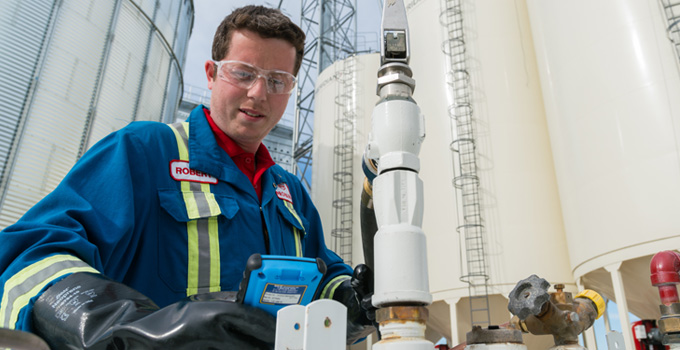If propane isn’t stored or handled properly, it can be a risk to you and those around you. This is why Co-op follows federal, provincial, and municipal legislation and regulations.

Review the following questions and answers to ensure you’re aware of the measures and procedures that keep you safe:
1. What do I do if I detect a leak?
- If you smell rotten eggs or cabbage, there may be a leak in your propane tank.
- Leave the area immediately.
- Extinguish all smoking materials and open flames.
- Do not touch anything that could create an ignition source and result in flames.
- Locate the propane equipment, and turn off the propane supply.
- Call the fire department or 911, and ensure everyone has left the area.
- Call Co-op to investigate and repair the leak once it’s deemed safe to return.
2. Why is my propane tank not filled all the way?
It’s illegal to fill propane cylinders or tanks to more than 80 per cent capacity. This allows room for volume changes because of temperature variations.
3. Why can’t I fill my own propane tanks?
Propane is a hazardous material and is dangerous to handle without proper training and personal protective equipment. It's required by law to have a record of training to fill propane tanks and cylinders.
4. When would I require an E2 Plan and when would the federal government need to be notified?
Environmental Emergency (E2) plans are required by Environment and Climate Change Canada (ECCC) for large volumes of hazardous substances located at facilities. A plan is required and ECCC must be notified when either the quantity of propane and maximum container capacity meets or exceeds 4.5 metric tonnes (2,330 USWG).
5. What’s so important about the safety relief valve on a propane tank?
The safety relief valve is one of the most important and vital valves on any liquefied-petroleum (LP) gas container. All propane tanks and cylinders are required by law to be fitted with safety relief devices designed to relieve excess pressure. The function of a safety relief valve is to keep a propane tank from rupturing in the unlikely event of excessive pressure buildup.
6. What is the regulatory body in Canada for propane safety?
Each province regulates the storage and handling of propane. Co-op’s technical specialists work with authorities to comply with all safety codes and standards when it comes to installing, inspecting and servicing our propane tanks.
For more information on propane safety and sales, speak to your local Co-op Fuel Team member, or contact one of our offices.

